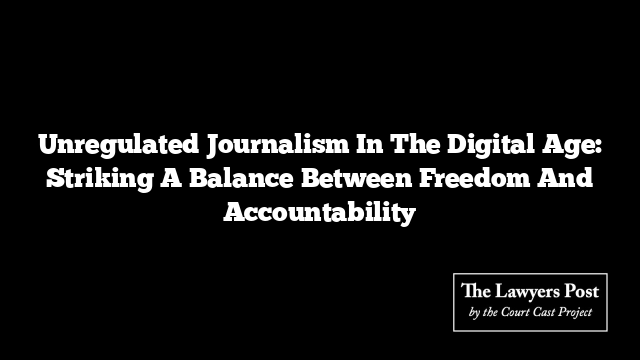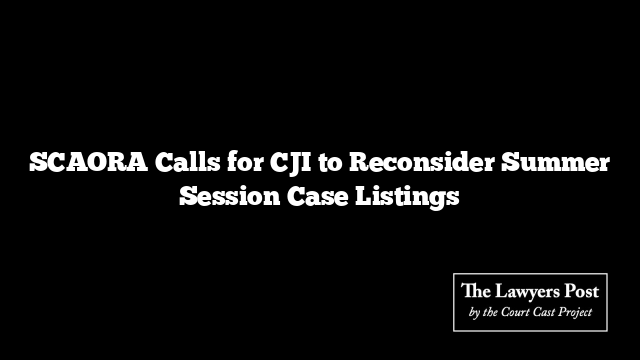By Iftikhar Hassan Samoon & Sartaj Hussain Bhat
In today’s age, where information flows freely and instantaneously, the role of journalism as the “fourth pillar of democracy” has never been more crucial. Journalists serve as the watchdogs of society, holding governments and powerful institutions accountable while providing citizens with the information they need to make informed decisions.
However, the rapid increase of unregulated journalism poses a significant threat to the integrity and effectiveness of this vital profession. At the heart of the issue lies the question of who gets to wield the power of information dissemination. Traditionally, journalism has been a profession that requires not only a commitment to ethical standards but also a certain level of expertise and training.
A Journalist is expected to possess a deep understanding of journalistic principles, including objectivity, accuracy, and fairness. However, nowadays anyone with an internet connection, a social media account and a mic can claim the title of “journalist,” regardless of their qualifications. The Indian Parliament defines a journalist as a person employed by a newspaper establishment as an editor, writer, reporter, correspondent, photographer, or proof-reader (Working Journalists and other Newspaper Employees and Miscellaneous Provisions Act 1955) yet the definition only covers the sphere of Print Media and leaves outside its ambit the digital media platforms particularly the social media platforms where anyone with a camera and a microphone can claim to be a journalist.
While in Print Media RNI (Registrar of Newspapers for India) registration is required in order to publish something, same is not the case with social media news accounts and web portals. This question came before the High Court of J&K&L in the year 2021 in the case of Jammu and Kashmir Peoples Forum Vs. Govt. of JK th. Pr. Sec. to Govt. & Ors. Wherein the Hon’ble Court observed “Apart from other things, the grievance raised in this Public Interest Litigation is about the mushrooming growth of news agencies on social media especially the news portals which are involved in circulating fake news. It is alleged that in the Union Territory, several such news portals like Kashmir News, Kashmir Voice, Kashmir Breaking News, News Kashmir 24/7, Kashmir Business Hub and Bol Kashmir etc. are operating freely without any registration or license from any authority and these news portals are not under supervision and control of any authority whatsoever.”
The absence of regulation in the field of journalism has led to a number of concerning implications:
Firstly, it raises questions about the purpose of a degree in journalism. If anyone can practice journalism without formal training or education, what value does a journalism degree hold? This devaluation of credentials undermines the hard work and dedication of trained journalists who have invested time and resources into honing their craft.
Secondly, the lack of formal qualifications raises doubts about the competence of untrained journalists. Without the foundational knowledge provided by a journalism degree, individuals may lack the skills necessary to gather, analyze, and disseminate information accurately and responsibly. This can lead to the spread of misinformation and fake news, eroding public trust in the media as a whole.
Furthermore, the absence of regulatory mechanisms means that untrained journalists may struggle to maintain the moral and ethical standards expected of the profession. Journalists are entrusted with the power to shape public opinion and influence policy decisions, making it imperative that they adhere to strict ethical guidelines. Social media platforms abound with pages and accounts run by self-proclaimed journalists, whose qualifications and motivations remain unknown. This proliferation of unverified sources not only confuses audiences but also undermines the credibility of legitimate news organizations staffed by trained journalists.
As a result, the public may struggle to differentiate fact from fiction. In response to these challenges, calls for greater regulation and accountability in the field of journalism have grown louder. Some advocate for the establishment of licensing requirements or professional standards for journalists, similar to those imposed in other professions such as law or medicine. Others emphasize the importance of media literacy education, empowering citizens to critically evaluate the sources and credibility of the information they encounter.
The issue of unregulated journalism raises fundamental questions about the balance between freedom of speech and the responsibility to uphold democratic principles. While the digital age has democratized access to information, it has also created new challenges that must be addressed to safeguard the integrity of journalism and preserve the essential role it plays in democratic societies.
The Indian judiciary could play a pivotal role by leveraging Article 19(2) of the Indian Constitution, which allows for reasonable restrictions on the freedom of speech and expression in the interest of the sovereignty and integrity of India, the security of the state, friendly relations with foreign states, public order, decency, or morality, or in relation to contempt of court, defamation, or incitement to an offense.
By imposing reasonable restrictions on who can claim the title of “journalist” is essential to distinguish between legitimate news sources and social media entities masquerading as journalism platforms. By requiring individuals to possess a valid degree in journalism or meet certain qualifications, the judiciary can establish a clear demarcation between professional journalists and amateur bloggers or Facebook page administrators.
Such guidelines would not only enhance the credibility and reliability of journalism but also empower the public to make informed decisions about the sources they trust. With a defined set of ethical and professional standards, accredited journalists would be held accountable for their reporting, reducing the spread of misinformation and promoting transparency in the media landscape.
Moreover, implementing these guidelines could address the issue of oversaturation in the field of journalism. Qualified journalists often struggle to compete with untrained individuals who flood the market with sensationalist or biased content. By restricting the use of the title “journalist” to those who meet specific criteria, the judiciary can help level the playing field and create opportunities for trained professionals to thrive.
However, while the imposition of such guidelines may seem straightforward, there are complexities and challenges to consider. Balancing the need for regulation with the preservation of freedom of speech is paramount. Any restrictions imposed must be carefully crafted to avoid stifling dissent or limiting the diversity of voices in the media.
While the judiciary might be hesitant to give any such guideline, but the masses have their faith in Judiciary as the Apex Court of the country is the sentinel on Qui Vive (an alert guardian) which protects our fundamental rights, and it is only this Court of Law which can be trusted while dealing with such sensitive issue which if not correctly dealt with might have an adverse effect.
Editorial Note by Adv. Iftikhar Hassan Samoon (Editor, The Lawyers’ Post)
The proliferation of unregulated journalism, particularly on digital platforms, poses significant challenges to the integrity of the media landscape. While social media has democratized information dissemination, it has also facilitated the spread of misinformation, undermining public trust. The lack of formal training and ethical standards among many self-proclaimed journalists exacerbates this issue, leading to sensationalism and biased reporting. To safeguard the credibility of journalism, it is imperative to establish clear regulatory frameworks and promote media literacy. Only through a concerted effort involving journalists, educators, and policymakers can we ensure that the media continues to serve as a reliable pillar of democracy.
~ Sartaj Hussain Bhat, is a graduate in Mass Media and Communication and is currently pursuing LLB (Hons.) from Dept. Of Law, University of Kashmir.





